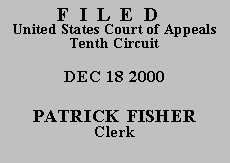

| UNITED STATES OF AMERICA,
vs.
JONEARL B. SMITH |
|
Background
In May 1999, Mr. Smith was indicted on one count of being a felon in possession of a firearm, 18 U.S.C. § 922(g)(1). The firearm was discovered when a police officer stopped Mr. Smith's car to investigate a crack in the car's windshield. In his motion to suppress, Mr. Smith argued that the officer did not have a specific, articulable basis for making the traffic stop and, therefore, that all the evidence found as a result of the stop, including the firearm, should be excluded.
At the suppression hearing, the officer testified that he stopped Mr. Smith because of a cracked windshield, a potential violation of Wichita, Kansas, City Code § 11.60.260(d).(1) The district court found that even though the windshield crack did not obstruct the operator's vision (and therefore did not violate the city ordinance), the officer "had a specific, articulable basis for suspecting the driver of violating the ordinance," and "[a]s such, he had an objectively reasonable basis for conducting an investigative detention to determine if there was a violation." Aplt. Br. Addendum B at 6-7. The district court therefore denied the motion to suppress.
The case went to trial and the jury found Mr. Smith guilty. Objecting to his presentence report, Mr. Smith argued that the district court should grant him a downward departure in sentencing because his prior attorney had entered guilty pleas to three misdemeanors in Municipal Court without his knowledge or authorization. Because each of these convictions was assessed one criminal history point, Mr. Smith argued that his prior criminal history should be reduced by three criminal history points, from nine to six. Based on this court's holding in United States v. Simpson, 94 F.3d 1373 (10th Cir. 1996), the district court denied Mr. Smith's request for a downward departure and sentenced Mr. Smith to fifty-one months' imprisonment.
Discussion
On appeal from a denial of a suppression motion, we review the district court's factual findings for clear error. United States v. Long, 176 F.3d 1304, 1307 (10th Cir. 1999). We must consider the totality of the circumstances and view the evidence in the light most favorable to the government. United States v. Hunnicutt, 135 F.3d 1345, 1348 (10th Cir. 1998). However, we review the ultimate determination of reasonableness under the Fourth Amendment de novo. Id.
"An initial traffic stop is valid under the Fourth Amendment not only if based on an observed traffic violation, but also if the officer has a reasonable articulable suspicion that a traffic or equipment violation has occurred or is occurring." Id. The government does not need to show that a violation actually occurred to justify the initial stop. Id.
In this case, we conclude that none of the district court's factual findings were clearly erroneous. The district court found that the officer had only a quick initial look at Mr. Smith's car as it drove by in the opposite direction, that the officer saw a crack in the car's windshield located in the middle or on the passenger side which ran vertically from the bottom to the middle of the windshield, and that the officer thought that the car might be in violation of the Wichita traffic ordinance concerning cracked windshields. Based on the totality of these circumstances and viewing the evidence in the light most favorable to the government, we agree that the officer had a "reasonable articulable suspicion" that a traffic violation had occurred. The district court's ultimate conclusion that the windshield was not cracked in such a way as to violate the ordinance is irrelevant.
In regards to Mr. Smith's motion for a downward departure in sentencing, we review the district court's factual findings at sentencing for clear error and its interpretation of the Sentencing Guidelines de novo. Simpson, 94 F.3d at 1380; see also United States v. Garcia, 42 F.3d 573, 575 n.2 (10th Cir. 1994) ("Although we have no jurisdiction to review a district court's discretionary decision refusing to depart downward, a district court's decision that it lacked authority to consider downward departure is subject to our review."). In this case, we are bound by our holding in Simpson, 94 F.3d at 1381-82. Mr. Simpson argued that because his prior counsel had entered a plea without his consent, that conviction should not be used in his criminal history calculation. We held that unless the collateral attack on the previous conviction is based on the complete denial of counsel, a district court sentencing a defendant under the guidelines is precluded from considering the collateral attack. Id. at 1381. Mr. Smith's attempts to distinguish his case from Simpson are unpersuasive. As the district court in this case correctly pointed out, Mr. Smith can attempt to have his prior convictions declared invalid through habeas relief, and, if successful, he may petition to reopen the sentence in this case. See Custis v. United States, 511 U.S. 485, 497 (1994). However, Simpson dictates that Mr. Smith's current attack must fail.
AFFIRMED.
Entered for the Court
Paul J. Kelly, Jr.
Circuit Judge
*. This order and judgment is not binding precedent, except under the doctrines of law of the case, res judicata, and collateral estoppel. This court generally disfavors the citation of orders and judgments; nevertheless, an order and judgment may be cited under the terms and conditions of 10th Cir. R. 36.3.
**. After examining the briefs and the appellate record, this three-judge panel has determined unanimously that oral argument would not be of material assistance in the determination of this appeal. See Fed. R. App. P. 34(a); 10th Cir. R. 34.1 (G). The cause is therefore ordered submitted without oral
1.Wichita, Kansas, City Code § 11.60.260(d) states: "No person shall operate any motor vehicle upon a public roadway with a windshield . . . which is cracked or shattered in any manner which obstructs the operator's vision."